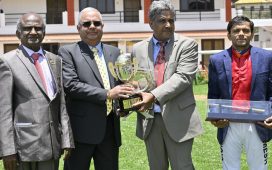Arrhythmias, or irregular heartbeats, in horses remain a fuzzy picture for those looking to prevent fatalities in horse racing, but one academic research team believes they will soon be able to make the causes slightly clearer. At a virtual presentation of the University of Minnesota’s annual Equine Conference held Jan. 21, Dr. Sian Durward-Akhurst outlined the progress on a large scale research project that she hopes will produce the first step toward a genetic test for cardiac arrhythmia in horses.
It’s not easy to catch arrhythmias in horses, in part because they don’t necessarily occur all the time. An electrocardiogram taken of a horse at rest may detect no abnormalities even if that horse experiences exercise-induced arrhythmias 20 minutes later when galloping on the track. Researchers also believe that arrhythmias can come and go, appearing during one bout of exercise and self-resolving spontaneously. They may come back again in days or weeks, or never again.
Research has shown that based on the arrhythmias that can be diagnosed, the condition may be surprisingly common. A series of peer-reviewed studies published between 2005 and 2015 showed that more than 20 percent of racehorses have arrhythmias during or after exercise, with 22 percent of Thoroughbreds showing supraventricular arrhythmias (originating in the upper portion of the heart) and 29 percent showing ventricular (lower portion of the heart) arrhythmias. As many as 46 percent of studied Standardbreds were found to have supraventricular arrhythmias, and 19 percent to have ventricular arrhythmias.
“What’s really interesting is when you look at these healthy racehorses, 16 percent of them have what we call a complex arrhythmia,” Durward-Akhurst said. “This is an arrhythmia that if you were in a hospital you would probably have defibrillator pads put on you because this gives you much greater risk of having sudden cardiac death. We’re seeing these arrhythmias in completely healthy horses that are racing and performing as they should be, or maybe have just a little bit of poor performance. They’re certainly not showing signs of really severe cardiac dysfunction, and we just don’t know why.”
The most common type of arrhythmia in horses is atrial fibrillation. The primary symptom of this and other types is poor performance, but many horses seem to live with the condition with no outward signs.
For many years, veterinarians have wondered whether so-called “sudden deaths” among racehorses could be blamed on undiagnosed arrhythmias. These sudden deaths are those that occur without any outward sign of fracture or trauma and account for about 19 percent of racing fatalities, according to Durward-Akhurst. Frustratingly however, about 47 percent of those cases seem normal when they undergo a necropsy, making it difficult to pinpoint the cause.
“Unfortunately, unless you have an ECG on a horse when it collapses and dies, it’s very difficult to prove arrhythmia is causing sudden death,” she said.
Sudden cardiac deaths also occur in human athletes, and about 30 percent of those also have no diagnosis on autopsy, which has led medical researchers to suspect exercise-induced arrhythmias could be to blame. We know that in both horses and humans, about 30 percent of atrial fibrillation cases are due to genetics, and we also know that research on humans have shown that exercise-induced arrhythmias are highly heritable, or likely to be explained by genetics.
Durward-Akhurst and her team have begun work on a large scale study aimed at identifying any genetic abnormalities that could predispose a horse to arrhythmia. Her plan is to perform cardiac exams on 500 racing Thoroughbreds and 500 racing Standardbreds and perform genetic analysis on 100 Thoroughbreds that had suffered sudden cardiac death and 100 Standardbreds diagnosed with atrial fibrillation. The goal was to see how useful ECGs were in identifying arrhythmias, and to determine if there were any common genetic variants among the horses found to have arrhythmias. In initial data-gathering, Durward-Akhurst sequenced the genomes of six Standardbreds with atrial fibrillation and cross-referenced gene variants that ere also present in the DNA of humans with the same condition. That brought her to 69 identified gene mutations in common.
Durward-Akhurst was partway into collecting cardiac exam data on racehorses when the COVID-19 pandemic hit last year, which has slowed down the process.
It’s likely, Durward-Akhurst said, that this issue isn’t as simple as a single gene going wrong, but rather several mutations coming together in the same horse to make cardiac problems more likely. That also means the study isn’t likely to find a single gene that can clearly mark breeding stock a “positive” or “negative” for arrhythmia, the way Quarter Horses are now identified by their HYPP status. Instead, it may lead to a genetic test that could determine whether an individual has a low, moderate, or high chance of passing on mutations that could predispose their offspring to the problem.
Of course, while genetics may account for 30 percent of atrial fibrillation cases, environment accounts for the other 70 percent. There are lots of other potential factors, and one of them Durward-Akhurst is most interested in is what trainers may have in their feed room.
“One thing we do worry about is supplements,” she said. “There’s an awful lot of horses out there that are on thyroxine, which is a thyroid hormone stimulant. When you look at what the thyroid does, it certainly does increase heart rate. There is no evidence that I’m aware of to show that these supplements are definitively causing a higher incidence of arrhythmias, but that’s something we definitely would like to look at. The same thing for the diet — some horses get very high and excited on high concentrate diets, but as to whether or not that contributes to risk of arrhythmia, that’s not yet known.”
New to the Paulick Report? Click here to sign up for our daily email newsletter to keep up on this and other stories happening in the Thoroughbred industry.
Copyright © 2021 Paulick Report.







